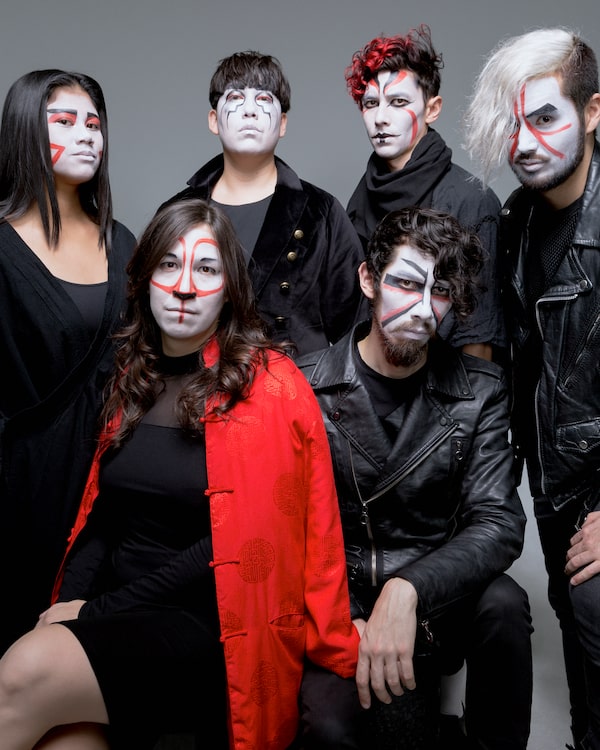
Toronto-based art-rock collective Yamantaka // Sonic Titan.Richmond Lam
On the day Yamantaka // Sonic Titan released its third full-length album, Dirt, the Toronto-based collective spent an afternoon traipsing around New York’s beloved East Village, poking into the neighbourhood’s last traces of weird.
I met all six members of the Juno and Polaris Prize-nominated art-rock collective in front of the avant garde La MaMa Theater, where vocalist Ange Loft has performed with the groundbreaking New York Indigenous performance company, Spiderwoman Theater. We browsed a Japanese toy store and meandered down the former punk promenade St. Marks Place in search of metal-band tees, before settling into a pizza spot loved by the band’s founder and drummer, Alaska B.
Over hot slices and sodas, the group, including singer Joanna Delos Reyos, bass player Brandon Lim, guitarist Hiroki Tanaka and keyboardist Brendan Swanson, began to disentangle the fable that makes up Yamantaka // Sonic Titan’s artistic cosmos. Every album is set on Pureland, a fictional sphere based on the Iroquois creation myth of “Turtle Island,” a term multiple Indigenous tribes use to refer to the landmass of North America. And the story arc on every record is informed by the group’s concerns with climate change and the Buddhist beliefs of a few of its members. Pureland is an avatar for a sense of despair, “the idea of history repeating itself because of humanity’s shortcomings,” Alaska says.
So it makes sense that their debut, 2011’s YT // ST, is about the end of that world. 2013’s UZU chronicles Pureland’s mass flooding, tens of thousands of years prior to the end. And Dirt, released after five years of line-up changes and side projects (including a video-game score), is set after the flood and before the end, explains Loft, “in a future run by Iroquois people living in pod cities off the planet.” Dirt storifies the environmental and human costs of industrialization, but it’s also a loud and whimsical rock album with strong hooks and a sense of drama. Its playful spirit is indebted to the band’s fondness for what some might call “nerd culture,” as well as specific seventies artifacts: the Japanese anime Space Battleship Yamato and Queen’s third record Sheer Heart Attack. The product of DIY tenacity and raw talent, Dirt is Yamantaka // Sonic Titan’s best album yet.

Yamantaka // Sonic Titan is certainly high concept, but the group is also reared on Canadian radio and informed by a reverence for total kitsch.Richmond Lam
Swanson says that some listeners think it’s about the U.S. presidential election. And though it was written and recorded at the time of mainstream awakening to Indigenous issues via 2013’s Idle No More uprising and the Dakota Access Pipeline protests in 2016, the band firmly avoids any suggestion that its message is reactionary. Instead, the fantastical framework of Yamantaka // Sonic Titan encourages a closer reading of history to understand the present.
“There is this really basic connection between land and bodies,” says Loft, who has only recently begun to “yell at” audiences in a more confrontational manner. “So I tell them, your need for land appreciation is connected to the depreciating of female bodies.”
“What we focus on is much bigger picture [than politics],” Alaska says. “Intersectionality is actually the one thing that connects us, because it means you have more than one identity — even if you are straight and white. There is more than one way to suffer. And things like climate change and missing and murdered Indigenous women are part of the same issue that all people can engage with: being poorly taken care of, and humanity’s arrogance, hubris and greed.”
Yamantaka // Sonic Titan is certainly high concept, high morals and high art, but it’s also a project reared on Canadian radio and informed by a reverence for total kitsch.
“Nothing we do is authentic in origin,” Swanson explains. “There are Spaghetti Western riffs on Dirt,” says Loft. “Those were originally made by Italian musicians [approximating] Native people.”
Instead, on Dirt, an Iroquois chant and some Filipino folk might be warped in texture and tone to mimic that manufactured filmic riff, creating what Swanson calls “true cultural exchange.”
In the past, despite the presence of strong melodies and ambitious performance, it was easy to suggest that the band’s music was too heavy to be accessible or its members too ethnic to be accepted as straight-up metal. Dirt challenges listeners to do away with distinction and give into something that feels undeniably pop. At a show following our interview, I’m amazed by how much more fun the band seems to be having since I last saw them perform, years ago back in Toronto.
“Everyone’s bringing their own influences to this record,” Swanson says. The hook on Yandere, Loft notes, riffs on a 1999 single by former New Kid on The Block, Jordan Knight. Hungry Ghost explodes into a strong groove that recalls the irreverent energy of ’90s rap-rock. The band tells me about growing up listening to radio in rural areas outside of big Canadian cities, where rap and rock and pop would collide. “We like the same things,” says Alaska, of that great cultural levelling. “Why do you not make space?”
In a parallel reality – Pureland’s perhaps – Yamantaka // Sonic Titan would be considered the best band in a country that has, until very recently, been defined by its obsession with sprawling art-rock collectives. “We don’t see ourselves as outside the milieu, we are only seen as outside because it’s frozen in time,” Alaska says. “I don’t see why race should stop us from joining the white rock canon.”